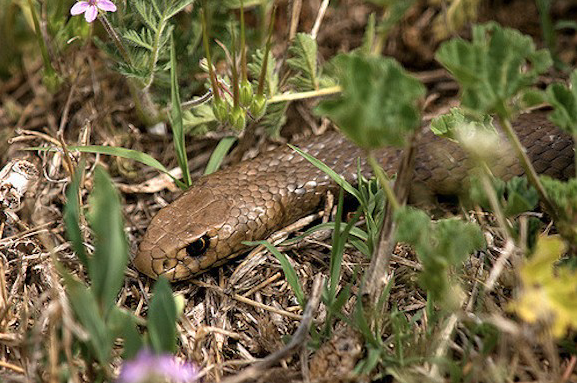Snakes alive: vets warn of danger time for pets

Tamara Kerr says her two-year-old Jack Russell terrier, Eddie, is lucky to be alive after suffering a snake bite earlier this year.
“I just knew something was wrong – mother’s instinct I guess,” she said.
His is an extreme case – just hours after being bitten, the terrier had stopped breathing and needed an emergency transfer to the University of Melbourne’s U-Vet Werribee Animal Hospital, where a team of experts worked around the clock to save him.
U-Vet veterinarian Kylie Kelers said it serves as an important warning to pet owners about the dangers of snake bite, particularly around this time of year.
Most Australians look forward to the start of spring but Dr Kelers said it signals the start of something far more ominous.
“At the Animal Hospital, we consider it the start of ‘snake season’,” she said.
“And it’s this time of the year – not summer – that may be the most dangerous time as far as snakes go.
“A lot of people associate snakes with being a summer-time thing, but we often see bites on fairly cool days, say 17°Celsius or 18°Celsius.”
While there are no firm statistics, it is estimated that thousands of household pets are bitten by snakes in Australia each year.
“Snakes at this time of the year are hungry and on the move,” said Dr Kelers, who has worked in the Emergency Centre of the U-Vet Hospital for 16 years.
“They have no shortage of venom stored up after fasting for much of the winter.”
On average, the hospital sees around 50 to 75 cases of snake bite a year.
Meanwhile, Eddie has fully recovered from his snake bite. He spent 24 hours on life support at the hospital’s intensive care unit before breathing on his own.
It was another nine days before he was well enough to head home.
“He was pretty much dead,” Ms Kerr said.
“He couldn’t walk or move, couldn’t blink. It took him a long time to recover, but now he’s perfect and we’re really lucky there was no long-term damage.”
Both dogs and cats fall victim to snake bite.
Dr Kelers said it was uncommon for snake bites to be witnessed, so owners should look out for signs such as vomiting, weakness or collapse as well as enlarged pupils.
If snake bite is suspected, owners should waste no time in getting their pet to a vet as soon as possible.
“All snake bites are an emergency, even if the clinical signs seem mild at the time,” Dr Kelers said.
“Let the veterinary reception know that you suspect a snake bite and keep your pet as calm and still as possible until they see a vet.
“If you can, carry them rather than have them walk.”
Given the high morbidity and cost of treatment for snake bite, Dr Kelers said prevention is always the best goal.
She recommended clearing backyards of long grass and rubbish piles and keeping dogs on lead when walking them near waterways or bushy areas.